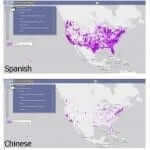French words we use in English
Believe it or not, you already know how to speak some French!
You know the latest product a la mode, you have a rendez-vous and you eat foie-gras.
You use French words in your everyday English vocabulary. You just don’t know it.
There are officially more than 300 French words in use in the English language that have French origins. Some of the words are still in use the French language, but some of them are obsolete words in France, or words that have different meaning now.
For example, petit-four in English is a design style for small desserts / cakes, but in French, it’s a salty canape to eat as an aperitif (cocktail). Or au jus, a sauce served with food or meat served with its natural juices from cooking. It’s no longer used in French except for in another sense: the slang, “etre au jus“, meaning to be informed.
Many French words are present in the English language because of the use of French in the English courts throughout the 11th century, after the Norman invasion of England of 1066.
For several centuries, government administration was in French. Today, nearly a third of English words are either French or have had a French influence.
Other famous French words used in English are:
- Adieu, “to God”: a permanent goodbye, therefore you will never see them again
- Baguette [no literal translation]: typical French bread
- Bon apetit, good appetite [literal translation]: means “enjoy your meal”
- Cliché, “stereotype”: fixed idea you have about something, also photographic term in French
- Crème Fraiche, “fresh cream”: heavy cream with bacterial culture
- Déjà-vu, “already seen”: illusion of thinking you have already witnessed a particular event or seen something before
- Hors-d’oeuvre, “outside the work”: appetizer, also a starter in French
- Omelette [no literal translation]: mix of fried eggs, typical French meal
- Tête-à-tête, “head-to-head”: intimate time, discussion between two people
- Vis-à-vis, “face-to-face”: opposed to vis; it’s an obsolete word in French for face; visage is its contemporary
We’re not unique. Believe it or not there are English words used in French too!


